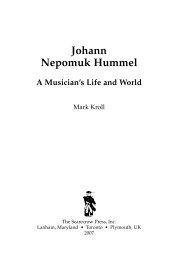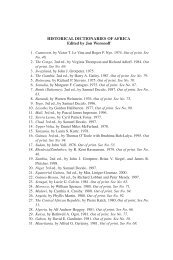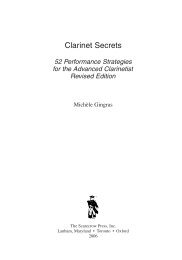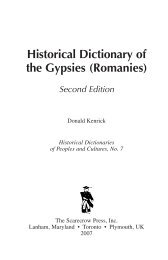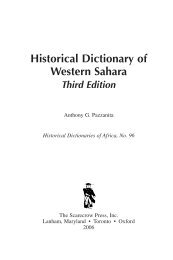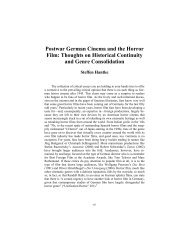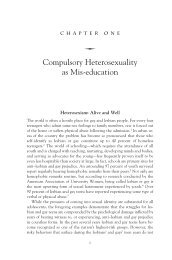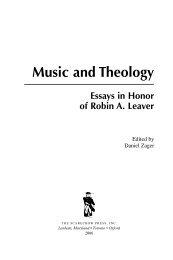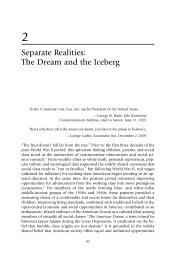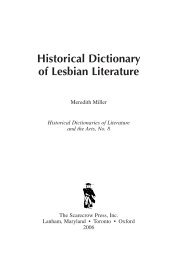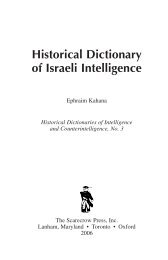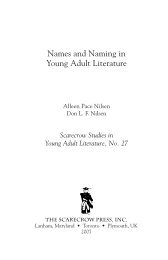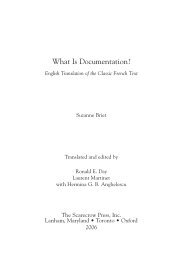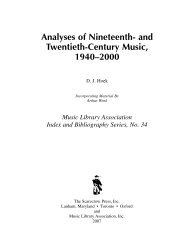Founded by Friends : the Quaker heritage of fifteen - Scarecrow Press
Founded by Friends : the Quaker heritage of fifteen - Scarecrow Press
Founded by Friends : the Quaker heritage of fifteen - Scarecrow Press
You also want an ePaper? Increase the reach of your titles
YUMPU automatically turns print PDFs into web optimized ePapers that Google loves.
xii Thomas D. Hamm<br />
into being. In some cases, that alienation has culminated in legal separation.<br />
In o<strong>the</strong>rs, yearly meetings have retained close control and have kept<br />
some <strong>of</strong> <strong>the</strong>se schools under close oversight. And in still o<strong>the</strong>rs, a legal relationship<br />
continues, but one marked at best <strong>by</strong> apathy and at worst <strong>by</strong><br />
considerable tension.<br />
QUAKERS AND EDUCATION: THE AMBIVALENT LEGACY<br />
Early <strong>Quaker</strong> attitudes toward education, as noted previously, were paradoxical.<br />
<strong>Friends</strong> valued it as useful but also feared it as potentially dangerous.<br />
This was especially true <strong>of</strong> higher education.<br />
Nowhere is this tension more evident than in <strong>the</strong> writings <strong>of</strong> George<br />
Fox (1624–1691), <strong>the</strong> preeminent figure in <strong>the</strong> early <strong>Quaker</strong> movement.<br />
Fox argued that all true ministers <strong>of</strong> Christ, men or women, should be<br />
called <strong>by</strong> Christ. Thus, “being bred up at Oxford and Cambridge did not<br />
make a minister <strong>of</strong> Jesus Christ.” This view <strong>of</strong> ministry shaped <strong>Quaker</strong> attitudes<br />
toward higher education. Before 1800, colleges and universities in<br />
Great Britain were tied to established churches and existed in large part to<br />
train clergy. For <strong>Friends</strong>, <strong>the</strong> link between <strong>the</strong>se “hireling priests” and<br />
higher education was so strong as to make <strong>Friends</strong> fearful <strong>of</strong> ei<strong>the</strong>r. A college,<br />
<strong>by</strong> its very existence, suggested that “head knowledge” could compete<br />
with or even complement knowledge gained through obedience to<br />
<strong>the</strong> Inward Light and <strong>the</strong> Holy Spirit. <strong>Friends</strong> were not given to compromise<br />
on matters <strong>of</strong> faith, and <strong>the</strong>y saw no room for compromise here and<br />
little to be gained even if <strong>the</strong>y had been so inclined. And in England and<br />
<strong>the</strong> British colonies in North America, as dissenters from <strong>the</strong> legally established<br />
churches, <strong>Friends</strong> could not enter <strong>the</strong> colleges and universities<br />
even if <strong>the</strong>y had been so inclined.<br />
On <strong>the</strong> o<strong>the</strong>r hand, George Fox and o<strong>the</strong>r early <strong>Friends</strong> were not entirely<br />
anti-intellectual. They valued certain kinds <strong>of</strong> education. Fox, for example,<br />
in a 1668 statement, urged <strong>Quaker</strong>s to establish schools, for both<br />
boys and girls, that would instruct <strong>the</strong>m “in whatever things were civil<br />
and useful in creation.” By <strong>the</strong> eighteenth century, <strong>Quaker</strong>ism and learning<br />
were <strong>by</strong> no means incompatible. By 1825, for example, sixteen English<br />
<strong>Friends</strong> had been admitted to <strong>the</strong> Royal Society, <strong>the</strong> highest honor possible<br />
for a British scientist. As <strong>Quaker</strong> communities developed in North<br />
America in <strong>the</strong> seventeenth and eighteenth centuries, schools usually appeared<br />
soon after <strong>the</strong> erection <strong>of</strong> a meetinghouse, with <strong>the</strong> same building<br />
<strong>of</strong>ten housing both. <strong>Quaker</strong> education, for <strong>the</strong> most part, was not that different<br />
from that found in o<strong>the</strong>r schools. Latin was useful in foreign trade,<br />
and Greek and Hebrew could contribute to understanding <strong>the</strong> Bible.<br />
<strong>Quaker</strong>s valued learning that <strong>the</strong>y saw having practical applications. As



